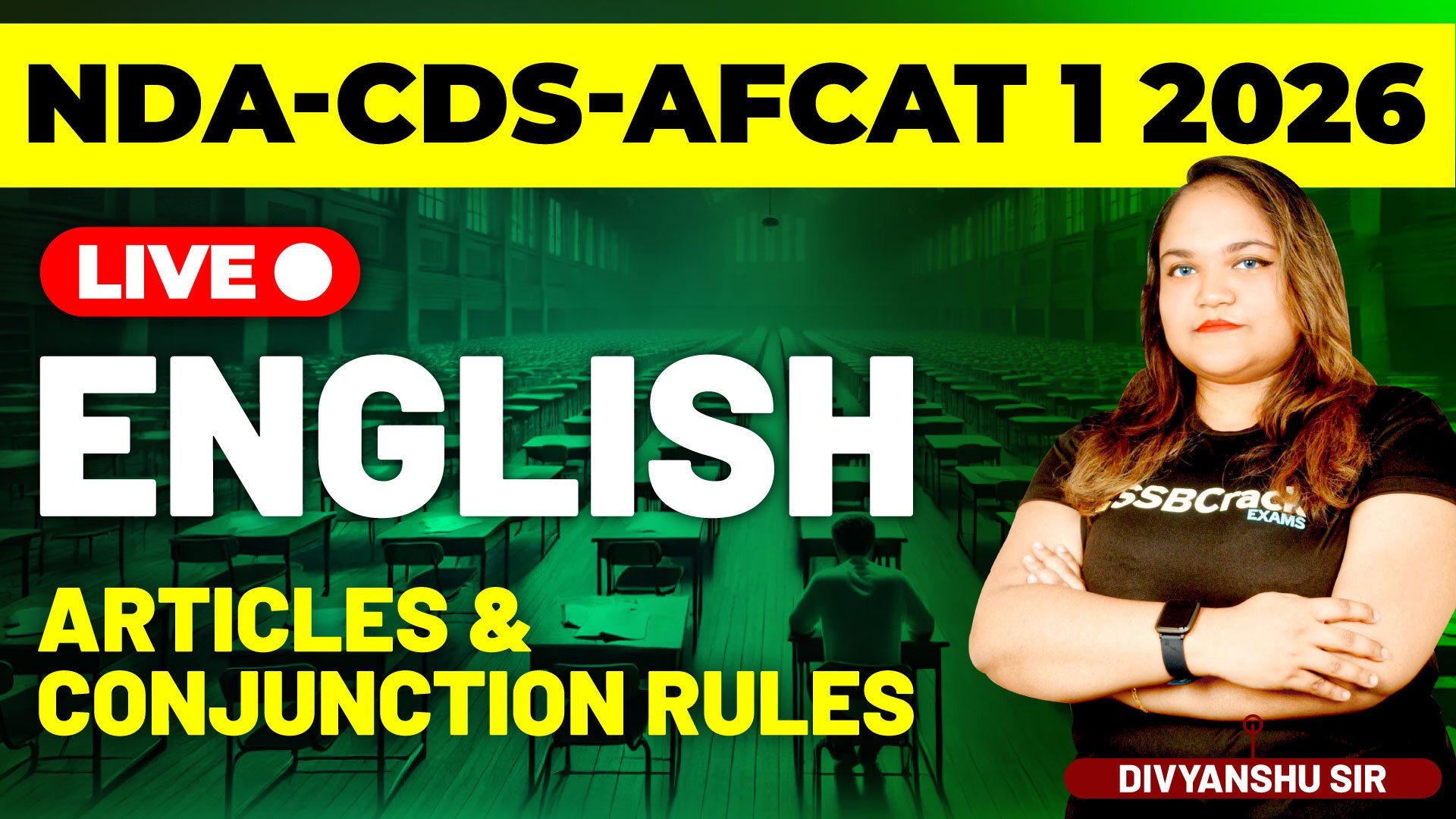The NDA, CDS & AFCAT 1 2026 English Live Class on Articles and Conjunctions was conducted to strengthen the grammatical foundation of aspirants preparing for the upcoming defence examinations. These two essential topics form a crucial part of English Grammar, often tested through Spotting Errors, Fill in the Blanks, Sentence Improvement, and Cloze Test questions. The session aimed to make aspirants exam-ready by explaining the key usage rules, exceptions, and application-based examples from previous year papers.
Understanding the Core Topics: Articles & Conjunctions
1. Articles – ‘A’, ‘An’, and ‘The’
Articles are determiners used before nouns to indicate specificity or generality. Though small in form, articles play a big role in defining the accuracy of a sentence — a skill highly tested in defence exams.
Key Rules Covered in Class:
- Use of ‘A’ and ‘An’ – Based on sound, not spelling.
Example: An honest man (because ‘honest’ begins with a vowel sound). - Use of ‘The’ – Used before specific or previously mentioned nouns.
Example: The sun rises in the east. - Omission of Articles – Before uncountable or plural nouns when speaking generally.
Example: Honesty is the best policy. - Special Rules & Exceptions –
- Before names of newspapers, holy books, and mountain ranges (The Hindu, The Gita, The Himalayas).
- Omission before proper nouns (Mount Everest, Lake Superior).
Example Question:
Choose the correct sentence:
(a) She bought a umbrella.
(b) She bought an umbrella. ✅
Explanation: ‘Umbrella’ begins with a vowel sound, hence an is correct.
2. Conjunctions – The Connectors of Ideas
Conjunctions are words that link words, phrases, or clauses to form coherent and meaningful sentences. Understanding their correct usage ensures logical sentence flow and grammatical precision.
Key Rules Covered in Class:
- Types of Conjunctions:
- Coordinating: and, but, or, nor, for, yet, so.
- Subordinating: because, although, since, unless, while, etc.
- Correlative: either…or, neither…nor, both…and, not only…but also.
- Rules for Correlative Conjunctions:
- Ensure both parts of the pair are used correctly.
Example: Either you must work hard or you will fail.
- Ensure both parts of the pair are used correctly.
- Avoiding Common Errors:
- No sooner…than (not no sooner…when).
- Hardly/Scarcely…when (not than).
- Sequence and Parallel Structure:
- The words or phrases joined by conjunctions must be grammatically parallel.
Example: She likes dancing, singing, and painting. ✅
- The words or phrases joined by conjunctions must be grammatically parallel.
Example Question:
Choose the correct sentence:
(a) No sooner did he reach the station when the train left.
(b) No sooner did he reach the station than the train left. ✅
Explanation: The correct pair is No sooner…than.
Importance of Articles & Conjunctions in NDA, CDS & AFCAT Exams
In all three exams — NDA, CDS, and AFCAT, English Grammar forms a significant portion of the paper. Articles and Conjunctions appear in:
- Spotting Errors: Questions involving omission or misuse of articles and incorrect pairing of conjunctions.
- Sentence Improvement: Correction of sentence flow and grammatical accuracy.
- Fill in the Blanks: Selection of appropriate articles or conjunctions for logical completion.
- Cloze Tests & Comprehensions: Enhancing the sense and structure of sentences through correct connectors.
Strong command over these rules helps candidates eliminate confusion, avoid grammatical traps, and improve accuracy, especially in questions that test conceptual understanding rather than memorization.
Highlights of the Live Class
The Articles & Conjunctions Live Class was designed to make grammar learning interactive, logical, and exam-oriented. The session included:
- Concept Explanation: Detailed rules with practical examples.
- PYQs & Practice Sets: Real exam questions from NDA, CDS & AFCAT.
- Quick Tips & Tricks: For identifying article/conjunction errors instantly.
- Live Doubt Solving: Real-time interaction for conceptual clarity.
By revising these topics thoroughly, aspirants develop a sharper grammatical sense — a must-have skill for tackling error detection, comprehension, and vocabulary-based questions effectively.
Conclusion
Articles and Conjunctions may appear simple, but their correct application often determines the accuracy and fluency of English in competitive exams. Through this English Live Class on Articles & Conjunctions, NDA, CDS & AFCAT aspirants gained the conceptual clarity and confidence required to tackle even the trickiest grammar questions.
Mastering these fundamental rules not only enhances one’s English grammar precision but also reflects the clarity of thought and attention to detail — traits every future officer must possess.







